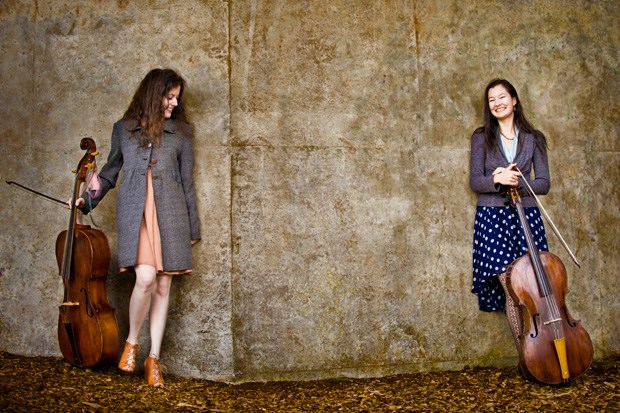Bradamante: Wild Love Cello Duets, Sunday, Nov. 24 at 3 p.m. at Kay Meek Centre, co-presented by Early Music Vancouver. Pre-concert chat with host Matthew White at 2:15 p.m. Tickets: $10-$36. kaymeekcentre.com.
Elinor Frey, one-half of cello duo Bradamante, named after a legendary female knight, laughs when she's asked about the line in her group's bio: "The bows are our swords."
"It's just kind of cute. It's not aggressive but it's nice to think of just getting out there and fighting the world with beautiful music. It's a lot of fun and I hope that comes across with the group that it's really for entertainment and enjoyment."
She and partner Shirley Hunt's project name, which translates to "wild lover," is taken from the Italian epic poem Orlando Furioso, by Ariosto, dating back to 1516.
"Every culture has their epic story and this is an important one in Italy," says Frey, a Seattle, Wash. native, who's currently based in Montreal, Que.
The poetic tale tells the story of Christian knights at the time of Charlemagne fighting the Saracens, whose army was attempting to invade Europe.
"One of the top three characters is named Bradamante, who is a female knight, and she falls in love with this Saracen knight named Ruggiero," explains Frey.
A further reason the duo chose the strong female character as its namesake was Bradamante's connection to the cello.
Orlando Furioso was written under the patronage of the d'Este family, her descendants.
"That was the first family that was a very important patron of the cello when the cello first emerged. So there's some strong connections in history, literature, arts and patronage, and Italy, all come together," says Frey.
During performances, she and Hunt read excerpts from the story of Bradamante's life, interspersed with Italian cello sonatas, heightening the story with their music.
Frey and Hunt, who's based in Boston, will present their program, featuring musical works by Giovanni Bononcini, Francesco Geminiani, Jean Baptiste Barrière and Antonio Vivaldi among others, Sunday, Nov. 24 at 3 p.m. at West Vancouver's Kay Meek Centre, a co-presentation with Early Music Vancouver.
Bradamante will also perform at the Early Music Vancouver Cellar Series Tuesday, Nov. 26 at 8 p.m. at The Cellar Restaurant and Jazz Club in Vancouver.
The performances mark Bradamante's West Coast premiere as well as that of a second ensemble Frey is also touring with, Pallade Musica. Reached Tuesday from Chicago, where she'd travelled for a performance with the quartet, the baroque cellist was also looking forward to introducing her second project, formed two years ago, to Vancouver audiences. Pallade Musica will take the stage tonight at 8 p.m. at Vancouver's Christ Church Cathedral at 690 Burrard St. Guests are invited to come early for a pre-concert chat by host Matthew White, Early Music Vancouver artistic director, at 7:15 p.m.
For Pallade Musica, Frey is joined by fellow early music specialists Tanya LaPerrière (baroque violin) and Mylène Bélanger (harpsichord) from Quebec, and Esteban La Rotta (theorbo) who's from Columbia.
"Montreal has a very strong early music scene and we were all playing in different groups there, groups that were more established and we started to get to know each other that way," say Frey. "And then we happened to play a piece together on a little series, a very casual series that I run, and we liked how it sounded so much, the combination of instrumental colours and just working together, so we decided to form a group and put on a full concert."
They entered the Early Music America Baroque Performance Competition in New York in October 2012, and came out on top as grand prize winners.
"That really encouraged us and helped us get going pretty intensely," says Frey.
She and her collaborators in both ensembles share a passion for sourcing out material that's not widely known, requiring extensive reading, research and trial.
"We're committed to doing both, known and lesser known as long as it's great," she says.
"We have to really believe that the audience is going to connect to it before we put it on the program," she adds.
They also share a passion for early music, feeling it leaves a lot of space for the performer's involvement.
"There's a lot of choices that the performer makes that really make a difference in the music and that's exciting," says Frey. "A lot of the articulations, dynamics and expression is really left to the performer to figure out and add. Also, it's really amazing how it sounds when you use an instrument that's the same construction as was used when the music was written. When you have the right tools and equipment it changes everything of how the music sounds and what you can do with it. It's beautiful, a lot of colours and interesting things that you don't get if you use the modern version of the instrument. That was just really appealing, I think, to all of us. And also, it's really fun to learn about history and to bring what you learn into the interpretation."
Pallade Musica has just recorded its debut album, featuring 17th century Venetian music composed by Dario Castello, Giovanni Legrenzi and Tarquinio Merula, in September and Frey anticipates its release on the ATMA label in April 2014.
In addition, she's celebrating the release of her new solo album, released this summer in Europe and this fall in North America, entitled LaVoce delVioloncello: Solo Works by the First Italian Cellist-Composers.
For more information visit earlymusic.bc.ca and elinorfrey.com.



